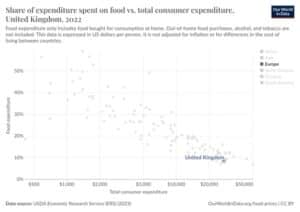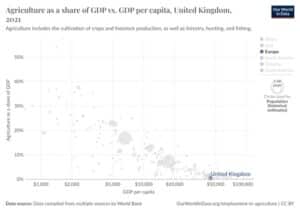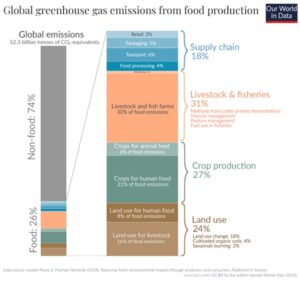Free trade vs “self-sufficiency” in agriculture: a rejoinder to my critics
SUGGESTED



My piece acknowledged the sector’s challenges, but still argued in favour of globalised food supply chains. This argument was not well-received by many commenters on social media or in some letters and calls. I have asked ChatGPT to summarise the arguments of the top comments criticising the article, to which I will respond.
1. Overreliance on imports: Many comments criticise the notion of depending too heavily on food imports, highlighting risks associated with global supply chain disruptions, wars, or international trade issues. Commenters argue for the importance of national food security and self-sufficiency, especially in times of global uncertainty.
This is by no means a new argument—trade protectionism to ensure access to food is a centuries-old idea. Still, it has again come to the fore following the COVID-19 pandemic, skyrocketing food inflation following Russia’s invasion of Ukraine, climate disruptions, and more. In this context, for many, the idea of not being self-sufficient in food is naïve at best and outright criminal at worst.
This argument, however, lacks a proper understanding of the nature and strength of Britain’s globalised food supply.
Britain is already not self-sufficient in food, and it has not been for several centuries. Around half of our food is imported, including over 90% of fresh fruit. Even in parts of food production where the UK looks relatively self-sufficient (e.g. chicken, beef, feed for livestock production and many vegetables), there is still significant trade.
The extent of food imports has not resulted in starvation but, rather, some of the widest food choices at affordable prices. As the graph below demonstrates, Brits spend among the lowest proportions of their incomes on food in the world. So, what about empty supermarket shelves in recent years? There have been times of stress on the food supply, particularly when consumers sought to “panic-buy” at the start of the pandemic. For the most part, the shelves were refilled within days and there was no serious prospect of shortages. The globalised supply kept up with our needs.

The concern, then, may be about recent food price inflation. That is, there may not be explicit shortages, but higher prices have forced families to ration, particularly following Russia’s war against Ukraine.
Let’s generously assume that we could produce enough food to be self-sufficient (which is highly doubtful: three-quarters of the UK landmass is already being used for agricultural production; and there are already ongoing agricultural worker shortages, so where are that extra land and the extra workers supposed to come from?). This does not mean that we should. A key insight dating back to Adam Smith and David Ricardo states that nations are much richer when they specialise rather than try to produce everything themselves. If the UK tried to produce more food, it would mean reducing labour and capital dedicated to producing higher-value goods, from financial services and consultancy to advanced manufacturing. This lower-value economy would transmit to everyday life through lower wages and a worse quality of life.
As the graph below demonstrates, there is a clear inverse relationship between how much a country depends on agriculture and its broader wealth, with some of the richest countries almost entirely out of the food production business. British farming also accounts for around 1% of the total workforce and 0.5% of gross value added to the economy; it is important but far from the centre of the British economy. It’s unclear why increasing the sector’s size should, in itself, be a priority.

The critics will then often retort, what happens during a crisis? Are you willing to starve for your fanaticism? Relying to a greater extent on domestic production is an awful idea for food security. This amounts to putting all your eggs in one basket. It would mean a single bad harvest resulting in shortages. There is a clear need to diversity your sources, particularly regarding an essential good like food.
This point was acknowledged in a government report on food security published last October, “Over-reliance on one geographical area and dependence on particular supply sources makes food supply more vulnerable, while diversity of sources makes it more resilient.” As it stands, most of Britain’s food imports are from the EU, and this will likely continue to be the case, though, with new trade deals signed with Australia, New Zealand and CPTPP, there is some potential for even greater diversification of our food sources. This is overwhelmingly good for British consumers and food security.
Food security isn’t just a theoretical problem; heavy rainfall and associated flooding over recent months are risking UK livestock and harvests this year. But should we expect food shortages? Probably not. We have been here many times. An example I’ve used previously is the decline in wheat yields in 2020. Lousy weather resulted in a 40% reduction in crop yields, yet prices barely went up (by 8% year-on-year). This was because the UK could still import wheat from other parts of the world, with the quantity imported jumping from 988,000 tonnes in 2019/20 to 2.3 million in 2020/21.
2. Underestimation of farming and local production: The article is strongly criticised for underestimating the value of local farming and the contributions of small-scale farmers. Commenters believe in supporting local farmers for their knowledge and their resilience to the food supply system, particularly in crisis situations.
I am in no way dismissing or belittling the contribution made by small-scale farmers; however, if consumers demand local, small-scale farming, there are currently few barriers to making that choice. But, in practice, most consumers are heavily price-conscious when it comes to the food that they consume. So, the way to ‘support’ these farmers is often a demand for protectionist policies. But this comes with high costs.
Tariffs and quotas would mean higher food prices, and subsidies would mean higher taxes and/or more borrowing. Protectionist policies have a globally distorting impact on the sector, leading to overproduction in some regions, particularly disadvantaging agricultural sectors in developing economies.
Protectionism also reduces competitive pressures, which means fewer options for consumers and less pressure on producers to invest and boost productivity. Notably, Australia and New Zealand became global leaders in agricultural exports after removing domestic subsidies and tariffs; that’s because they specialised in certain crops and invested heavily in the sector.
Advocates for protectionist policies may try pointing out economic activity and jobs ‘saved,’ but these tend to be relatively few and come at a high cost. For example, an assessment of President Trump’s washing machine tariffs found that the imposition saved 1,800 jobs, but it cost an astonishing $815,000 for each one of those jobs.
3. Environmental and Ethical Concerns with Importing Food: Many responses express concerns over the environmental impact of importing food, such as the carbon footprint associated with long-distance transportation. Additionally, there are worries about the ethical standards of food production abroad, including animal welfare and labour practices, compared to the UK’s higher standards.
Agriculture is undoubtedly a major contributor to environmental degradation and climate change. It accounts for half of all habitable land, 70% of freshwater, and a quarter of global greenhouse gas emissions. But to suggest that long-distance transportation is the problem is entirely incorrect. Just 6% of the carbon footprint associated with food production relates to transport.

Eating local is often not best for the environment. It requires a more holistic assessment of the production process. For example, if the UK were to start trying to grow significant amounts of fruit in greenhouses, it would require significant electricity, which would likely dwarf any carbon savings from reducing the importation of fruits. Previous studies have found that, even after accounting for transport, New Zealand lamb has a lower carbon footprint than Welsh lamb, as it is produced in a more efficient manner and transport emissions are minimal.
There are then the concerns about the safety and quality of food produced abroad. The assumption underlying this claim is that the UK has necessarily and uniquely high or cumbersome standards. This may be true in some small ways. Still, UK food is produced under standards identical to those of the European Union and equivalent to other developed and most developing economies. In other words, UK food production is not unique; it involves the same sorts of pesticides and animal treatment as the rest of the developed world.
Furthermore, food imported into the UK must follow the same stringent legal standards as domestic production for animal welfare, including living conditions, slaughter practices, and transportation; safety and hygiene; and traceability and labelling. For example, Australia operates a special European Union Cattle Accreditation Scheme that ensures full traceability and compliance with the EU’s market requirements for beef. This ensures that these cattle are not treated with hormonal growth promotants (HGPs), which are still the rules for UK beef after Brexit (even if some might argue for a reassessment). Food imports mast also pass through stringent safety checks, often including physical checks. According to the Food Standards Agency, there has been consistently high compliance, with 99% of imports passing checks.
4. Economic Sustainability of Farming: The article is criticised for overlooking the economic challenges farmers face, including the impact of regulations and market pressures that favour cheap imports. There’s a call for policies that ensure fair compensation and support for local farmers to maintain their livelihoods and the agricultural landscape.
Farmers clearly face many challenges; it’s a gruelling lifestyle and competition keeps down consumer prices. However, the role of public policy is not to maintain the lifestyle of any given occupational group. Farmers should not be entitled to a handout from taxpayers for simply existing. Like any other industry, farmers should be paid based on the market value of their product, which reflects the value to others.
Intense agriculture can also be associated with significant environmental costs, such as soil degradation, water system pollution, deforestation, and lost biodiversity. Farmers will continue receiving £2.4 billion per year from taxpayers under the post-Brexit subsidy scheme. Now, instead of being based on per acre of land, these handouts will be in exchange for environmental goods.
To be clear, there are many ways in which the government makes life harder for farmers than in needs to be. There are serious costs associated with regulations in relation to environmental matters, including the use of fertilisers and net zero measures. British farmers also struggle with the cost of other particularly expensive inputs, such as electricity. However, the solution to the government imposing higher costs is to stop imposing them – a “first, do no harm” approach – rather than compensate for them via subsidies.
These debates about agriculture and free trade have been raging for many centuries. It is entirely legitimate for farmers to want to be protected from outside competition, to keep prices higher and to make their lives simpler. The challenge for policymakers, however, is whether to put the broader interest ahead of the loudest self-interested voices.
1 thought on “Free trade vs “self-sufficiency” in agriculture: a rejoinder to my critics”
Comments are closed.




A very convincing response, Matthew.